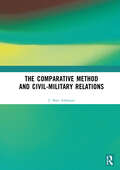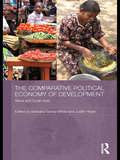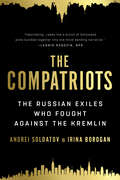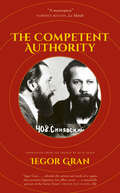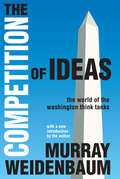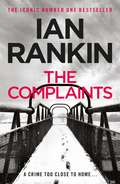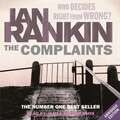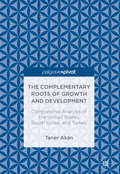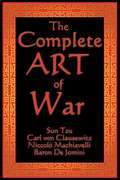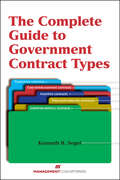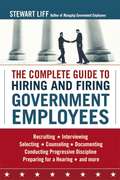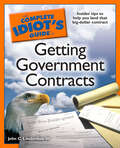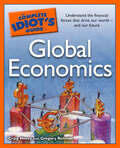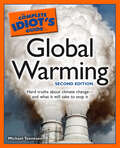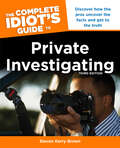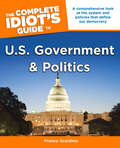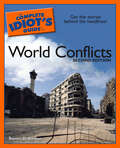- Table View
- List View
The Comparative International Politics of Democracy Promotion (Democratization Studies)
by Hans-Joachim Spanger Jonas Wolff Hans-Jürgen PuhleThough scholarly attention to democracy promotion is increasing, there is still little comparative and theoretically-based work on the protagonists of democracy promotion. This book investigates the motives that drive democracy promotion in a comparative and theoretically oriented manner, exploring how democracy promoters deal with conflicting objectives and the factors that shape their behaviour. It also addresses the more policy-oriented debate on the contemporary challenges to democracy promotion, focusing on US and German policies towards three kinds of challenges: the emergence of ‘radical’ leftist governments in Bolivia and Ecuador, the political rise of Islamist movements in Turkey and Pakistan, and the consolidation of (semi-)authoritarian rule in Belarus and Russia. In each case, North-Western democracy promoters have been confronted with serious conflicts of objectives between security, economic interests and democracy promotion. The analysis and comparison of such situations in which democracy promoters have to deal with competing objectives and make tough decisions provides powerful evidence as to the factors that shape democracy promotion. The Comparative International Politics of Democracy Promotion will be of interest to students and scholars of international relations, comparative politics, democratization studies and foreign policy.
The Comparative Method and Civil-Military Relations
by J. 'Bayo AdekanyeComprising critical writings in civil-military relations theory and research, this book of essays integrates the ideas and insights drawn from political science, particularly its subfields of comparative politics, theory and methodology both normative and empirical, with those from the combined disciplines of philosophy of science, history, sociology, and development studies, bringing out the relevance of these ideas and insights for understanding and analysing the issues central to the place and role of military in the Nigerian society.This book will be useful to students, academics, journalists and activists working on Nigeria in particular, and Africa in general.Print edition not for sale in Nigeria.
The Comparative Political Economy of Development: Africa and South Asia (Routledge Studies in Development Economics)
by Barbara Harriss-White Judith HeyerThis book illustrates the enduring relevance and vitality of the comparative political economy of development approach promoted among others by a group of social scientists in Oxford in the 1980s and 1990s. Contributors demonstrate the viability of this approach as researchers and academics become more convinced of the inadequacies of orthodox approaches to the understanding of development. Detailed case material obtained from comparative field research in Africa and South Asia informs analyses of exploitation in agriculture; the dynamics of rural poverty; seasonality; the non farm economy; class formation; labour and unfreedom; the gendering of the labour force; small scale production and contract farming; social networks in industrial clusters; stigma and discrimination in the rural and urban economy and its politics. Reasoned policy suggestions are made and an analysis of the comparative political economy of development approach is applied to the situation of Africa and South Asia. Aptly presenting the relation between theory and empirical material in a dynamic and interactive way, the book offers meaningful and powerful explanations of what is happening in the continent of Africa and the sub-continent of South Asia today. It will be of interest to researchers in the fields of development studies, rural sociology, political economy, policy and practice of development and Indian and African studies.
The Comparative Politics of Immigration: Policy Choices in Germany, Canada, Switzerland, and the United States (Cambridge Studies in Comparative Politics)
by Antje EllermannMany governments face similar pressures surrounding the hotly debated topic of immigration. Yet, the disparate ways in which policy makers respond is striking. The Comparative Politics of Immigration explains why democratic governments adopt the immigration policies they do. Through an in-depth study of immigration politics in Germany, Canada, Switzerland, and the United States, Antje Ellermann examines the development of immigration policy from the postwar era to the present. The book presents a new theory of immigration policymaking grounded in the political insulation of policy makers. Three types of insulation shape the translation of immigration preference into policy: popular insulation from demands of the unorganized public, interest group insulation from the claims of organized lobbies, and diplomatic insulation from the lobbying of immigrant-sending states. Addressing the nuances in immigration reforms, Ellermann analyzes both institutional factors and policy actors' strategic decisions to account for cross-national and temporal variation.
The Compatriots: The Brutal and Chaotic History of Russia's Exiles, Émigrés, and Agents Abroad
by Andrei Soldatov Irina BoroganThe authors of The Red Web examine the shifting role of Russian expatriates throughout history, and their complicated, unbreakable relationship with the mother country--be it antagonistic or far too chummy.The history of Russian espionage is soaked in blood, from a spontaneous pistol shot that killed a secret policeman in Romania in 1924 to the attempt to poison an exiled KGB colonel in Salisbury, England, in 2017. Russian émigrés have found themselves continually at the center of the mayhem.Russians began leaving the country in big numbers in the late nineteenth century, fleeing pogroms, tsarist secret police persecution, and the Revolution, then Stalin and the KGB--and creating the third-largest diaspora in the world. The exodus created a rare opportunity for the Kremlin. Moscow's masters and spymasters fostered networks of spies, many of whom were emigrants driven from Russia. By the 1930s and 1940s, dozens of spies were in New York City gathering information for Moscow.But the story did not end with the collapse of the Soviet Union. Some émigrés have turned into assets of the resurgent Russian nationalist state, while others have taken up the dissident challenge once more--at their personal peril. From Trotsky to Litvinenko, The Compatriots is the gripping history of Russian score-settling around the world.
The Competent Authority
by Iegor Gran'Great is the Soviet Union, vast its territories, warm its entrails...' 1959. Whispers of dissidence are spreading in the U.S.S.R. Texts published in the West are circulating in samizdat, tormenting the secret police. Lieutenant Ivanov of the K.G.B, under pressure from his enraged superiors, is handed the case.Leads emerge, flare up, vanish. Years pass. 'Abram Tertz' publishes another short story, a new novel, mocking the competent authority. Shielded by his fierce wife Maria Vasilyevna Rozanova, Andrei Sinyavsky, one of the Soviet Union's most renowned and brilliant figures of resistance, waits in his wired apartment, drinking, sure his days as a free man are numbered.But as Rozanova continues to taunt Ivanov with her cheerful intransigence, a crisis of confidence opens up within the regime's resolve, causing the young lieutenant to wonder, 'are we actually as competent as we claim to be?''With the unique insight afforded by his mother, Rozanova, Gran pays remarkable homage to Andrei Sinyavsky, his father, reimagining the six long years leading up to his infamous arrest, trial and conviction. Framed within a riveting cat-and-mouse dynamic; irreverent and darkly comic, Gran balances a satirical lightness with deeper meditations on dogma and freedom of expression, state control and creative resistance, the ghosts of which, at a time when political criticism is being crushed once again, are as present today as ever before.
The Competition of Ideas: The World of the Washington Think Tanks
by Murray WeidenbaumMurray Weidenbaum has been a visiting scholar at the American Enterprise Institute and the Center for Strategic and International Studies, a speaker at meetings at the Brookings Institution, the Cato Institute, and the Heritage Foundation and has also written for their publications, and served as a reviewer of ongoing studies. In The Competition of Ideas, Weidenbaum examines the political economy of these vital institutions, drawing heavily on several decades of involvement in their activities. He is uniquely able to see their accomplishments as well as their shortcomings.Because of the importance of the activities of their organizations, and their tax-exempt status, think tanks are held to a high standard. Weidenbaum shows that sometimes think tanks are more tank than think major think tanks are often predictable in the positions they take on public issues and are far better at analyzing the shortcomings of other elements of society than of their own operations. The overarching issue of quality control, Weidenbaum holds, deserves more attention than it has attained in the think tank world.This book presents a careful, balanced account of where think tanks have been and where they are now headed. Given the high levels of professionalism in many think tanks, a fundamental change in the attitude of their management is important. The compelling need is less for the wielder of policy than for the lucid synthesizer of relevant research and analysis. Likewise, society needs sensitivity to the long-term concerns of the citizenry more urgently than rapid response to the opportunities of the moment. Future competition, particularly among the major think tanks, could well be centered, not on achieving greater visibility, but on developing responses to economic, environmental, and national security problems that are likely to be adopted and carried out.
The Competitive Strength Of European, Japanese, And U.s. Suppliers On Asean Markets
by Martin Gross Ulrich Hiemenz Rolf J Langhammer Jamuna P AgarwalOriginally published in 1987. This study evaluates micro- and macroeconomic determinants for the export performance of European suppliers to the markets of the Association of Southeast Asian Nations (ASEAN). By comparing marketing strategies and the respective economic environment of suppliers from ElH"ope , Japan , and the U S - the major exporter
The Complaints
by Ian Rankin'Unmissable Rankin, as gripping and involving as any Rebus story' CHOICE; 'A brilliant book' GUARDIANFrom the No.1 bestselling author of A SONG FOR THE DARK TIMES'On the evidence of THE COMPLAINTS it looks as if Fox will be just as sure-footed a guide to the city as his grizzled predecessor' DAILY EXPRESS.Nobody likes The Complaints - they're the cops who investigate other cops. Complaints and Conduct Department, to give them their full title, but known colloquially as 'the Dark Side', or simply 'The Complaints'. Malcolm Fox works for The Complaints. He's just had a result, and should be feeling good about himself. But he's middle-aged, sour and unwell. He also has a father in a care home and a sister who persists in an abusive relationship. In the midst of an aggressive Edinburgh winter, the reluctant Fox is given a new task. There's a cop called Jamie Breck, and he's dirty. Problem is, no one can prove it. But as Fox takes on the job, he learns that there's more to Breck than anyone thinks. This knowledge will prove dangerous, especially when murder intervenes.
The Complaints
by Ian Rankin'Unmissable Rankin, as gripping and involving as any Rebus story' CHOICE; 'A brilliant book' GUARDIANFrom the No.1 bestselling author of A SONG FOR THE DARK TIMES'On the evidence of THE COMPLAINTS it looks as if Fox will be just as sure-footed a guide to the city as his grizzled predecessor' DAILY EXPRESS.Nobody likes The Complaints - they're the cops who investigate other cops. Complaints and Conduct Department, to give them their full title, but known colloquially as 'the Dark Side', or simply 'The Complaints'. Malcolm Fox works for The Complaints. He's just had a result, and should be feeling good about himself. But he's middle-aged, sour and unwell. He also has a father in a care home and a sister who persists in an abusive relationship. In the midst of an aggressive Edinburgh winter, the reluctant Fox is given a new task. There's a cop called Jamie Breck, and he's dirty. Problem is, no one can prove it. But as Fox takes on the job, he learns that there's more to Breck than anyone thinks. This knowledge will prove dangerous, especially when murder intervenes.
The Complaints: From the Iconic #1 Bestselling Writer of Channel 4’s MURDER ISLAND
by Ian RankinNobody likes The Complaints - they're the cops who investigate other cops. Complaints and Conduct Department, to give them their full title, but known colloquially as 'the Dark Side', or simply 'The Complaints'. Malcolm Fox works for The Complaints. He's just had a result, and should be feeling good about himself. But he's middle-aged, sour and unwell. He also has a father in a care home and a sister who persists in an abusive relationship. In the midst of an aggressive Edinburgh winter, the reluctant Fox is given a new task. There's a cop called Jamie Breck, and he's dirty. Problem is, no one can prove it. But as Fox takes on the job, he learns that there's more to Breck than anyone thinks. This knowledge will prove dangerous, especially when murder intervenes.Read by James Macpherson(p) 2009 Orion Publishing Group
The Complementary Roots of Growth and Development: Comparative Analysis of the United States, South Korea, and Turkey
by Taner AkanThe common roots of success and failure in economic growth and development lie in the systemic governance and fragmentation of institutional complementarities, respectively, but not in the unilateral adaptation of market-led or state-led models. To substantiate this argument, Akan utilizes case countries from the United States, South Korea, and Turkey—an advanced developed, a recently developed, and a developing country. Akan provides a simple framework for understanding two points that go beyond ideological obsession. The first is how a model of G&D works and evolves; with its economic, financial, industrial, and political dynamics intertwining. The second is why a market-led or state-led model succeeds and fails in both developed and developing countries.
The Complete Art of War
by Niccolo Machiavelli Sun TzuCollected here in this 4-in-1 omnibus are the most important books ever written on the art of war. The Art of War By Sun Tzu translated and commented on by Lionel Giles, On War by Carl von Clausewitz, The Art of War by Niccolò Machiavelli, and The Art of War by Baron De Jomini. These four books will give you as complete a view on the art of war as you can attain. This is the most important book ever written about warfare and conflict. Lionel Giles' translation is the definitive edition and his commentary is indispensable. The Art of War can be used and adapted in every facet of your life. This book explains when and how to go to war, as well as when not to. Learn how to win any conflict whether it be on the battlefield or in the boardroom. Although Carl von Clausewitz participated in many military campaigns, he was primarily a military theorist interested in the examination of war. On War is the West's premier work on the philosophy of war. Other soldiers before him had written treatises on various military subjects, but none undertook a great philosophical examination of war on the scale of Clausewitz's. On War is considered to be the first modern book of military strategy. This is due mainly to Clausewitz' integration of political, social, and economic issues as some of the most important factors in deciding the outcomes of a war. It is one of the most important treatises on strategy ever written, and continues to be required reading at many military academies. Niccolo Machiavelli considered this book his greatest achievement. Here you will learn how to recruit, train, motivate, and discipline an army. You will learn the difference between strategy and tactics. Machiavelli does a masterful job of breaking down and analyzing historic battles. This book of military knowledge belongs alongside Sun-Tzu and Clausewitz on every book shelf. Antoine-Henri Jomini was the most celebrated writer on the Napoleonic art of war. Jomini was present at most of the most important battles of the Napoleonic Wars. His writing, therefore, is the most authoritative on the subject. "The art of war, as generally considered, consists of five purely military branches,-viz.: Strategy, Grand Tactics, Logistics, Engineering, and Tactics. A sixth and essential branch, hitherto unrecognized, might be termed Diplomacy in its relation to War. Although this branch is more naturally and intimately connected with the profession of a statesman than with that of a soldier, it cannot be denied that, if it be useless to a subordinate general, it is indispensable to every general commanding an army." -Antoine-Henri Jomini
The Complete Guide to Government Contract Types
by Kenneth R. SegelEverything You Need to Know About Government Contract TypesAs the world's single largest buyer of goods and services, the federal government has many ways to structure its procurements. Different situations and conditions often determine the best vehicle for a particular purchase. Contracting officers must assess a wide range of factors to determine which contract type will provide the government the best value and the least risk.The Complete Guide to Government Contract Types provides a comprehensive overview of the key government contract vehicles and types: fixed-price, cost-reimbursement, incentive, and other (which includes letter, indefinite-delivery/indefinite-quantity, and time-and-material contracts). The author first explains the selection process for contract vehicles, which is the basis for selecting the appropriate contract type for the work in question. He then presents a comprehensive, in-depth analysis of each contract type, explaining how each works best to meet certain types of requirements and conditions.This is an essential resource for both contracting officers and contractors seeking to understand and work effectively within the nuances of contract selection and compliance.
The Complete Guide to Hiring and Firing Government Employees
by Stewart LiffNot only does government bureaucracy often make hiring a cumbersome, slow-moving process, but poor performers enjoy more protection from losing their jobs than their counterparts outside of government. With over thirty years’ experience as a federal government employee, insider Stewart Liff offers a solution to the government talent shortage--enabling government managers to cut through the red tape and take advantage of the best government employees out there. The Complete Guide to Hiring and Firing Government Employees also teaches readers the equally important skills of efficiently documenting and dealing with those who don't make the cut to ensure your team starts and stays strong. You’ll discover: how to take an anticipatory approach to recruiting; how to decide who to target, and where and how to advertise for open positions; how to screen and interview candidates; how to counsel a poor-performing employee; how to use progressive discipline; how to document a case and write a charge; how to develop internal political support; and much more. Bringing the best new people on board and weeding out the worst are both the most important and the most difficult tasks faced by any employer. For federal managers, the challenge is even greater. Filled with tried-and-true strategies, this step-by-step guide will equip you to continuously uphold, strengthen, and even grow an entire department of high achievers.
The Complete Idiot's Guide To Parliamentary Procedure Fast-track
by Jim SlaughterEasy, accessible, and to the point, The Complete Idiot's Guide® to Parliamentary Procedure Fast-Track gives you everything you need to know to conduct shorter, fairer, more orderly meetings. In this time-saving guide, you get: The fundamentals of parliamentary procedure, with tips on knowing which rules to use for your meetings. Simple suggestions for making, seconding, and debating motions, plus advice on frequently used motions from Robert's Rules of Order. A primer on voting, from knowing when it's required, to breaking ties, to handling absentee and proxy votes. Straightforward strategies for setting and sticking to an agenda and efficiently recording your meeting's minutes. Tips for handling disruptive members and tyrannical chairs. Book jacket.
The Complete Idiot's Guide to Cultural Etiquette
by Carol TurkingtonSurviving in a foreign country may sometimes seem a bit like playing a game of Monopoly without knowing the rules-Park Place, Marvin Gardens, all those railroads-and what's the deal with that little iron, anyway? In much the same way, making sense of other cultures without any preparation can be a frustrating and downright difficult undertaking if you don't know the score. When you're in a foreign country, the signs don't make sense, buses operate under a set of alien rules, and how do you decipher the body language and intent of the natives when "no" seems to mean "yes" and people keep giving you shocked looks for behavior that wouldn't raise an eyebrow back home? This book will help guide you through the mystifying minefield of international culture-when to do the right thing, when to avoid the wrong thing, and how to understand the difference. This book gives an overview of each country, discussing how to dress, eat, entertain (and be entertained!), tip (or not tip!), speak, negotiate, barter, and travel into and out of the countries of our world. It also informs you how to avoid problems of health and safety, and who to call if you've plunged in recklessly anyway and gotten into trouble. In short, it's a handy sidekick to keep you out of trouble, something you can turn to when you've kissed instead of bowed, or shaken instead of stirred. Whether you're leaving the safe haven of your own country for business or pleasure, the more you learn about other cultures, the better you will be able to decipher foreign attitudes and actions, making you a more sophisticated, sensitive, and successful ambassador.
The Complete Idiot's Guide to Getting Government Contracts
by John C. LauderdaleInside strategies and tips for small businesses seeking government business This guide takes the small business owner through the different vehicles of the government procurement process, showing how the government selects a contract winner. It goes step-by-step from registration through the bidding process and beyond. And while the book is weighted to federal contracts, there is plenty of coverage on winning state and local contracts as well. • In 2006, small businesses won $77 billion in federal contracts • Slow economy forcing small businesses to procure more contracts, at all levels of government • Inside strategies and tips: a vast majority of small business owners know nothing about getting government contracts
The Complete Idiot's Guide to Getting Government Jobs
by The Partnership for Public SvcBail yourself out with employment opportunities In these turbulent times when private corporations are in trouble, the employer that seems to be offering the most stable employment opportunities is the public sector. With The Complete Idiot's Guide® to Getting Government Jobs, readers will learn how to navigate the government application process to find stable employment opportunities available from county municipalities as well as state and federal agencies. • Includes advice on drafting resumes suited to the specific requirements of the hiring agency • How to complete the appropriate application most effectively • Methods of marketing an applicant's skills in the government sector • Search tools for government job websites
The Complete Idiot's Guide to Global Economics: Understand the Financial Forces That Drive Our World—and Our Future
by Craig Hovey Gregory RehmkeThink outside the borders. Global economics affects every aspect of our lives. Free trade agreements, tariffs, terrorism, trade deficits, international debt, global warming, OPEC, outsourcing, and sweat shops are just some of the forces driving our world, food supply, jobs, and future. The Complete Idiot's Guide® to Global Economics provides the key to understanding the various facts, figures, policies, and practices that offer insight into this dynamic subject.
The Complete Idiot's Guide to Global Warming, 2nd Edition: Hard Truths About Climate Change—and What It Will Take to Stop It
by Michael TennesenRevisiting the most important topic of our time The rapid warming of the Earth's climate has been a concern for decades. Though many of us understand that temperatures will-on average-rise, the science and the resulting social, economic, and political implications of such a change are far-reaching and complex. This new edition has been completely overhauled, synthesizing the latest information into an easy–to–read reference that provides a fair assessment of climate change, its costs, and even its short-term benefits.• Covers the newest science and issues surrounding global warming• Written by a seasoned science/nature journalist
The Complete Idiot's Guide to Private Investigating, Third Edition: Discover How the Pros Uncover the Facts and Get to the Truth
by Steven Kerry BrownThe mystique of private investigating draws significant numbers of people to consider it as a career or side business. At the same time, individuals want to learn investigative techniques to solve their own personal and legal problems. In The Complete Idiot's Guide® to Private Investigating, Third Edition, private investigator and former FBI agent Steven Kerry Brown shares his hard-won expertise on everything you need to know to track down people and information, including: Tapping phones and recording conversations. Interviewing and interrogating to get important information. Tricky but legal ways to get needed evidence like the pros. Performing onsite, online, and mobile surveillance without being detected. Skip tracing to find lost loves or people who owe money. Investigating backgrounds of potential employees or spouses. Searching public records online and at the courthouse. Catching a cheating spouse and gathering evidence for divorce cases. Finding runaway teenagers. Doing diligent searches connected with adoptions and estates. Tracking down burglars, thieves, pickpockets, and purse snatchers. Advanced techniques and business advice for those interested in starting their own investigative or background screening agency. Along the way, Brown shares fascinating stories from his cases that highlight his clever methods for tracking down evidence and helping his clients find out what they need to know.
The Complete Idiot's Guide to U.S. Government and Politics
by Franco ScardinoThe governed must know their government Understanding how our government functions and the political forces that influence it is vital for all Americans. As a comprehensive overview and history of the subject, this book is designed to help anyone interested in learning about our government and the origins of its complex inner workings, our political system, and key elements that have affected our growth as a nation—all while serving as the best supplementary reading a student can get.• Author is an experienced Advanced Placement teacher• Students looking to take AP exams are a ready audience-along with citizenship applicants and CNN junkies• Large renewable market• Suitable as supplemental reading for coursework
The Complete Idiot's Guide to World Conflicts, 2E
by Steven D. StraussCold hard facts on the world&’s hot spots. Now readers can make sense of the daily headlines with an examination of the sides and issues of evolving conflicts. This updated edition provides coverage of all of the hot conflict spots in our world today, background and history, new and added coverage of the war on terror, and up-to-date coverage on the Middle East, including Iraq. • As Iraq continues to dominate the news, there is, unfortunately, no shortage of other trouble spots—this guide looks at conflicts around the globe. • An accurate reference source for high school and college students, and a great overview for people who want more in-depth understanding of daily events.
The Complete Idiot's Guide to the American Presidency: Get Inside the Minds of the Men Who Have Held and Shaped Our Nation’s Highest Of
by Alan AxelrodFrom George Washington to George W. In the course of the 2008 presidential campaigns, Americans became involved in the political process at a level rarely seen in modern history. But even before the historic race, George W. Bush's tenure had left many Americans wondering how we got to where we are today. The Complete Idiot's Guide® to the American Presidency takes readers from the first president to the one who just stepped down-exploring the legacies of the greatest leaders and the black marks against others, and showing the ways in which they left their stamp on both the nation and the presidency itself.• Written by the author of the highly successful The Complete Idiot's Guide® to American History, Fifth Edition• Appendices that list the presidents and their vice presidents, the presidential elections, and further reading

